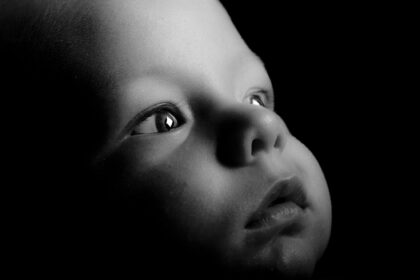
With Christmas less than two weeks away, I imagine many of us have babies on the brain. Apparently I did, because when I went looking for a paper to discuss, what jumped out at me was this paper on infant cognition (Preprint for those without access). It’s not an especially splashy paper; it’s not getting the news coverage of the latest AI developments or the claims of a theory which can reconcile gravity and quantum theory (a claim which awaits independent verification). But I suppose that’s in keeping with the themes of Christmas too. So, what can we learn by showing eight month olds movies of rolling balls?
We humans have remarkable cognitive abilities; we know they are remarkable because we cannot stop remarking on them. But really, no other creatures go to such elaborate lengths to understand what they understand and how they come to understand it. For example, we all have strong intuitions about cause and effect, from the types of causes that can yield various effects to the basic idea that effects should have causes at all. One way to figure out where those intuitions come from is to ask how soon we acquire them. Do we learn them by the age of 5? 3? Are we born with them? The answers could tell us something about the kinds of experiences that could inform those intuitions. To find out, we have to test kids of different ages, which eventually means figuring out what babies are thinking even before they can talk.
One long-standing approach is to surprise them. Babies, like many of the rest of us, pay more attention to the unexpected than to the mundane. (Maybe because prediction is central to perception?) So you can gauge whether babies can learn a particular rule is by showing it to them, then breaking that rule and seeing whether they react differently. If they spend more time looking when the rule is broken than when it is not, then they have some concept of the rule because they were surprised when it wasn’t followed.
The rules in question here involve who or what can cause particular effects. First, Adibpour & Hochmann tested if the babies understood that one rolling ball can bump into another and cause the second to roll. So the babies watch movies where most of the time, the bumping happens behind another object which obscures the bump. Then sometimes, those same babies actually get to see the bump. And then other times, the obscuring object is removed but no bump happens; the first ball stops short of the second ball, which nevertheless starts rolling a moment later. If the babies understand the cause-and-effect of the bump, they should be surprised when the second ball starts rolling despite the lack of apparent cause. And evidently they were.

Then a second setup probed more complex cause and effect. By eight months, babies almost certainly have had many experiences with objects colliding, so it makes sense that they could develop an intuition about such interactions. But what about more abstract effects which are not so obviously a product of fundamental forces? In the second setup, the ball bumps into a cube which flickers instead of moving. Again, most of the time the bump is hidden, but sometimes it is not and sometimes there is no bump but the flicker happens anyway. Based on their reaction, the babies were not any more surprised by one situation or the other–I guess cubes just flicker sometimes–unless the ball was launched by an agent.
Now, I say “agent” because that’s the word the researchers used, but really it was a sphere with a smiley face on it, basically a 3D smiley emoji. When the smiley emoji launched the ball, the babies were surprised when the cube blinked despite the lack of contact, presumably because they had inferred that the “person” was making the cube blink by using the ball. But they made no such inference if the ball was launched by an otherwise identical sphere that lacked a face and so didn’t read as a “person.” What the researchers conclude from this is that even at eight months, we have the ability to understand multi-step cause-and-effect and to understand that humans can cause effects that other things cannot. While not a finding of this study, I also think it’s remarkable babies already have such an abstract concept of personhood that a smiley emoji can satisfy it; I wonder if that is learned from our current cultural environment or if human infants have always had such a capacity.
Now, we could wonder whether this tendency to ascribe more complex cause-and-effect to people has implications elsewhere, but maybe that’s a conversation for another time.
Given the season, all of this baby talk got me thinking about Jesus’ cognitive development. Is it controversial to think he even experienced such a thing? I imagine it is not controversial to suppose that Jesus went through a physical development, with strength and endurance of normal proportions to his size–as opposed to the way toddler Superman could lift a car. But for some reason, possibly the way that preteen Jesus is depicted as unusually and possibly supernaturally intelligent, it seems somewhat untoward to actually say that Jesus was born with less than the full set of cognitive capabilities that he would ultimately possess. At the same time, it is hard to imagine things any other way. A newborn Jesus who could talk or a toddler who knew the Torah would have been just as surprising as a sedan-lifting Superboy.
If we grant that infant Jesus started out with different capabilities, that also implies a development process, which we associate with neurological development. For the rest of us, that means learning heuristics and developing intuitions from the specific set of experiences we have. This too is a remarkable feature of human cognition, that we can infer so much so quickly from comparatively little data. You needed far fewer language examples to learn to read and write than ChatGPT did. The tradeoff is that sometimes what we learn is biased by those experiences. Do we assume Jesus went through a comparable process? That would seem to lead in directions at odds with the theology I’m familiar with. We could avoid that path by supposing that Jesus was provided with the right opportunities to develop the optimal set of heuristics. That seems to suggest an incarnation which was not a single miracle at a specific moment in time, but an ongoing series of miracles or one miracle that spanned a lifetime.
I’ve not thought about the incarnation that way before; have you? Do you have different take on what baby Jesus thought or didn’t think and how he became an adult?
Andy has worn many hats in his life. He knows this is a dreadfully clichéd notion, but since it is also literally true he uses it anyway. Among his current metaphorical hats: husband of one wife, father of two teenagers, reader of science fiction and science fact, enthusiast of contemporary symphonic music, and chief science officer. Previous metaphorical hats include: comp bio postdoc, molecular biology grad student, InterVarsity chapter president (that one came with a literal hat), music store clerk, house painter, and mosquito trapper. Among his more unique literal hats: British bobby, captain’s hats (of varying levels of authenticity) of several specific vessels, a deerstalker from 221B Baker St, and a railroad engineer’s cap. His monthly Science in Review is drawn from his weekly Science Corner posts — Wednesdays, 8am (Eastern) on the Emerging Scholars Network Blog. His book Faith across the Multiverse is available from Hendrickson.

Leave a Reply